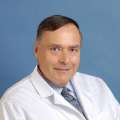THE RUSSIAN INVASION OF UKRAINE has displaced more than 12 million people, among them nearly 180,000 newly diagnosed cancer patients in need of treatment and medication. As they have in past international crises, people at UCLA Health stepped up to help.
Since June, two shipments of cancer drugs and supplies gathered by faculty, staff and students of UCLA Health have been shipped to Ukraine for patients desperately in need.
The first shipment, coordinated by John A. Glaspy, MD ’79 (RES ’82, FEL ’83), Simms/Mann Family Foundation Chair in Integrative Oncology and professor of medicine at the UCLA Jonsson Comprehensive Cancer Center, and Project HOPE, a global health and humanitarian aid organization, arrived in Kharkov, Ukraine, on June 8.
“Typically, in a situation like this, people might buy [cancer] drugs and donate them, but that isn’t efficient or sustainable,” Dr. Glaspy says. Instead, he went straight to the source — the manufacturers — where he spoke with biopharmaceutical CEOs about sending donations to Ukraine.
Both companies, Amgen and McKesson, agreed to the arrangement.
“THE DELIVERY WAS COMPLEX, involving import and export regulations and customs in three nations — the United States, Poland and Ukraine,” says Jason Obten, Project HOPE global logistics director. “It required precision timing to ensure that the cold-chain requirements were maintained throughout the shipping process up to the point of delivery in Kharkov.”
The shipment included 3,000 vials of filgrastim, a drug to help the body make white blood cells after chemotherapy treatment. The donation to the Grigoryev Institute of Medical Radiology and Oncology of The National Academy of Medical Sciences of Ukraine has thus far helped treat more than 50 patients.
“We cannot thank Dr. Glaspy and UCLA Health enough for the tremendous effort to make this donation possible,” Obten says.
A second shipment followed in July, 25 pallets of medical supplies, ranging from surgical masks and face shields to sponges and bandages — more than 13,000 pounds — to the International Medical Corps of Ukraine in Kyiv.
“We had leftover medical supplies from Care Harbor [an annual clinic to provide medical care to underserved populations in Los Angeles], and donating to Ukraine was the best way for us to utilize them,” says Candis Crockett, principal analyst at UCLA Health, who helped manage the donation logistics. “It’s been a difficult time with the global supply chain, so it made sense that sending supplies, rather than money, would have a greater impact.”
Students from Medical Aid Initiative, a student-run organization partnering with UCLA Health to share resources globally, also participated in the effort, donating supplies and time in the warehouse.
“Every time there has been an international crisis, we have turned to the MAI students to help support our humanitarian efforts, and their contribution as they gather and prepare shipments of available medical supplies has been invaluable,” says Fedra Djourabchi, director of strategic marketing at UCLA Health.
One of the greatest aspects of this donation was that people from all areas of the organization joined in, according to Crockett. “From clinical engineers helping with CO2 monitors to the patient-transport team, who shuttled students and volunteers from campus to the warehouse to help assemble the pallets, everyone pitched in.”
It’s “our responsibility as a health organization to help not only our own patients, but patients in our global community,” Djourabchi says.
UCLA Health has a long history of such engagement. When a devastating earthquake struck Haiti in 2010, a team of doctors and nurses assembled to help. Some went as part of an organized UCLA effort — Operation Haiti — while others traveled on their own or with other non-governmental organizations. In 1999, when war broke out between ethnic Albanians and ethnic Serbs and the government of Yugoslavia in Kosovo, a 26-member UCLA medical team joined with International Medical Corps to deliver care to Kosovar refugees. And for the past six months, UCLA Health recreational therapist Christie J. Nelson has been working on the Poland-Ukraine border to provide aid to Ukrainian refugees fleeing from the Russian invasion of their country (see Epilogue in this issue, “Letter from Medyka,” page 60).
Dr. Glaspy was motivated to act in response to what he sees as a disturbing trend in geopolitical dynamics, a situation that has him contemplating history and moral values. “What we see happening in Ukraine is not new,” he says. “The bigger picture is that good and evil have been afoot in the world for as long as there’s been people. And in my view, evil has been slowly winning.”
As further evidence, he calls forth a Pulitzer Prize-winning photo taken during the famine in Sudan in the early 1990s of a frail child who has collapsed trying to reach a feeding station just a half-mile

